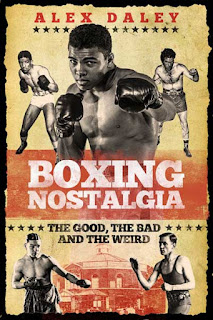 |
| Photo by Ira Rosenberg |
When you think of the great Irish-American fighters, Muhammad Ali probably isn’t the first name that springs to mind. Nevertheless, the Emerald Isle can at least stake a claim to the heavyweight great as one of its own. Ali’s maternal great-grandfather, Abe Grady, was born in County Clare, in the west of Ireland. Later, he moved to America, married an African-American woman and ultimately became a grandfather to Ali’s mother, Odessa Lee Grady.
Despite his one-time connection with black Islamist group the Nation of Islam, Ali did not try to hide his Irish roots. In fact, in 2009, he visited his great-grandfather’s County Clare town of Ennis, meeting distant cousins and becoming the first person in 600 years to be given the freedom of Ennis. But it wasn’t Ali’s first time in Ireland. The by-then frail ex-champ had actually boxed there in 1972.
Forty-five years ago this week, Dublin’s Croke Park was the stage for if not a classic Ali performance, then at least an Ali promotion like no other.
The event was the brainchild of Michael ‘Butty’ Sugrue, a circus strongman turned publican whose prodigious feats of strength were the stuff of legend. Though Butty had dabbled in fight promoting, pubs were what he knew best. So when he proudly announced that he would stage a Muhammad Ali fight in Ireland, few believed him. The claim seemed too fanciful to be true — that is until Ali stepped off a plane at Dublin airport.
His opponent was ex-gym-mate Alvin ‘Blue’ Lewis, a fearsome ex-convict from Detroit who had apparently given Muhammad many hard spars. Both men trained for the fight in Dublin, Lewis doing so in relative obscurity as the most famous sportsman on the planet garnered all the attention. Ali was the toast of the town, appearing multiple times on Irish TV, meeting a top hurling player as a PR exercise and doing his utmost to promote the bout.
But although Ali’s presence in Ireland generated huge interest, the fight flopped as a business venture. Fewer than 19,000 showed up at the 82,000-capacity Croke Park and many of them hadn’t paid. Thousands without tickets ignored the official gateway and clambered into the arena for free. Sugrue and his US co-promoter, Harold Conrad, lost about £20,000. The show’s organisation was so poor that boxing gloves had to be flown in at the last minute as no one had thought to supply them.
The top-line bout did not see the virtuoso performance from Ali that Ireland had hoped for. Reporting for BN, Graham Houston noted that, though dominant, the legendary heavyweight ‘often plodded and seemed unable to sustain his offensive drives’. Apparently, Ali was suffering with a head cold and was probably also guilty of looking past this test to bigger fights — in particular to a return with Joe Frazier, who had relieved him of his unbeaten record 16 months before.
But the Dublin fans didn’t seem to mind. Hordes of them piled into the ring to congratulate Ali when the ref pulled Lewis out in the 11th round. Peak form or not, it’s not every day the world’s most famous sportsman performs on your doorstep.
The above Muhammad Ali image is from the New York World-Telegram and Sun collection at the Library of Congress. According to the library, there are no known copyright restrictions on the use of this image.
Article © copyright Alex Daley.
This piece by Alex Daley (first published in Boxing News on 20 July 2017) is one of 132 articles featured in the anthology Boxing Nostalgia: The Good, the Bad and the Weird. You can find our more or buy a copy here.

